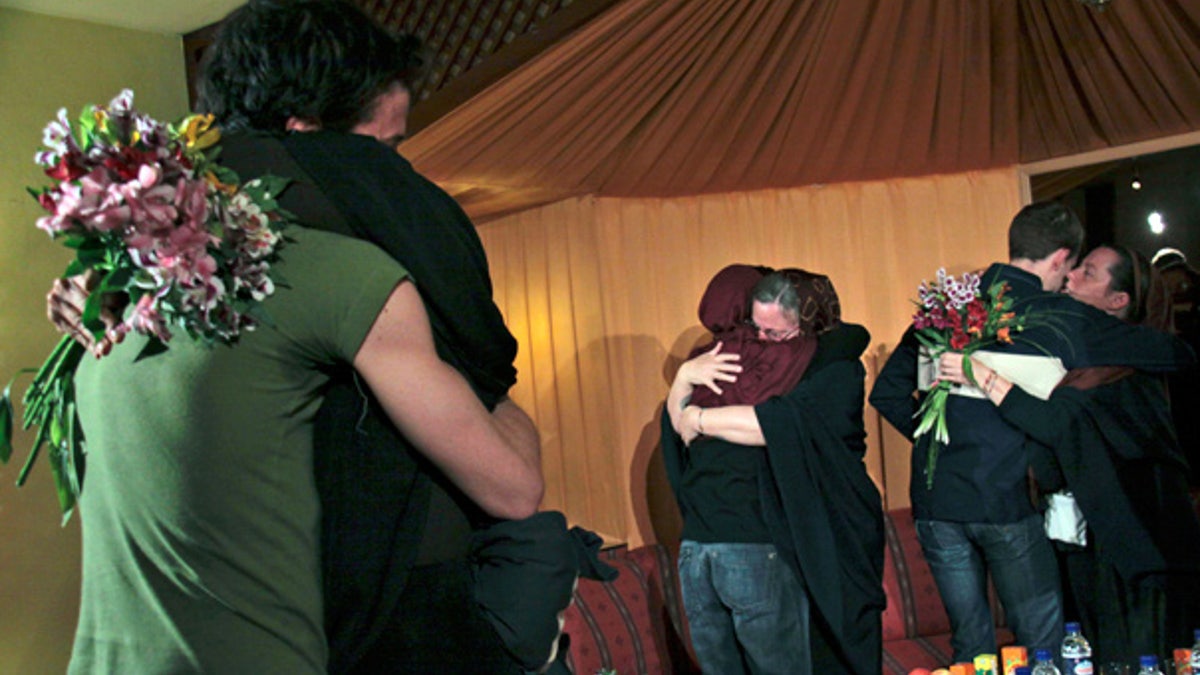
May 20: The mothers of 3 Americans detained in Iran hug their children at the Esteghlal hotel in Tehran. (AP)
TEHRAN, Iran – TEHRAN, Iran (AP) — An Iranian official said Tuesday the country has no plans to swap three American prisoners for a missing nuclear scientist who Tehran claims was abducted by the U.S.
Foreign Ministry spokesman Ramin Mehmanparast said it is not Iran's practice to "exchange people whose cases are still with the judiciary" and dismissed suggestions that the fate of the three Americans is linked to that of scientist Shahram Amiri.
"These two cases are not comparable," Mehmanparast told reporters in Tehran. "Iran will use legal channels to secure the release of Amiri."
Iran claims the scientist, who disappeared while on a pilgrimage to Saudi Arabia, was abducted by the U.S. in 2009.
The three Americans — Sarah Shourd, her boyfriend, Shane Bauer of Minnesota, and their friend Josh Fattal — were arrested along the Iraqi border last July. Iran has accused them of espionage and entering the country illegally. Their families say the three were hiking in Iraq's largely peaceful mountainous northern Kurdish region and that if they crossed the border, it was accidental.
Iran allowed the mothers of the three to visit them in May, the families' first contact with them since they were taken into Iranian custody. The mothers had hoped to secure their children's release, but returned empty-handed to the United States after a two-day visit.
Also in May, Iran's intelligence minister Heidar Moslehi signaled Tehran might be open to a prisoner swap with the U.S. for the three Americans. President Mahmoud Ahmadinejad had also mentioned a swap in March, but nothing was officially proposed.
Before Amiri disappeared, he worked at Iran's Malek Ashtar University, an institution closely connected to the country's powerful Revolutionary Guard.
U.S. media reported in March that Amiri had defected to the United States and was assisting the CIA in efforts to undermine Iran's nuclear program. Iran is facing more sanctions over its refusal to curtail its nuclear program, which the West suspects is aimed at producing nuclear weapons but which Tehran says is only for peaceful purposes.
Mehmanparast's remarks came after Iran's state TV on Monday showed a video of a man it identified as Amiri. The footage showed a man wearing headphones and speaking through what appeared to be a webcam, saying he was abducted while on a pilgrimage to Medina, injected with a tranquilizer and taken to the United States.
The man in the footage was shown next to a photograph of Amiri and bore a close resemblance. He said the video was recorded on April 5 in Tucson, Arizona, and that he has been tortured while in the U.S.
A U.S. official dismissed the Iranian claim, saying it was false.
"It's absurd for anyone to claim that the United States is in the business of torturing people into false claims of defection or anything else. That's not how we work, it makes no sense, and it's just not so."
The official spoke on condition of anonymity to discuss the claim without authorization.
On Tuesday, Iran summoned the Swiss ambassador to discuss Amiri. Switzerland represents U.S. interests in the absence of diplomatic relations between Washington and Tehran. The official IRNA news agency said an Iranian Foriegn Ministry official presented the ambassador with evidence to support Iran's claim that Amiri was abducted and demanded he be returned to Iran.
Mehmanparast said the three Americans are held "under conditions that go beyond international standards on detentions," while he claimed Amiri has had no consular access and there has been no way to verify his state of health.
Apart from the visit by their mothers, Swiss diplomats in Tehran have also met with the three Americans.
___
Associated Press Writer Kimberly Dozier in Washington contributed to this report.








































